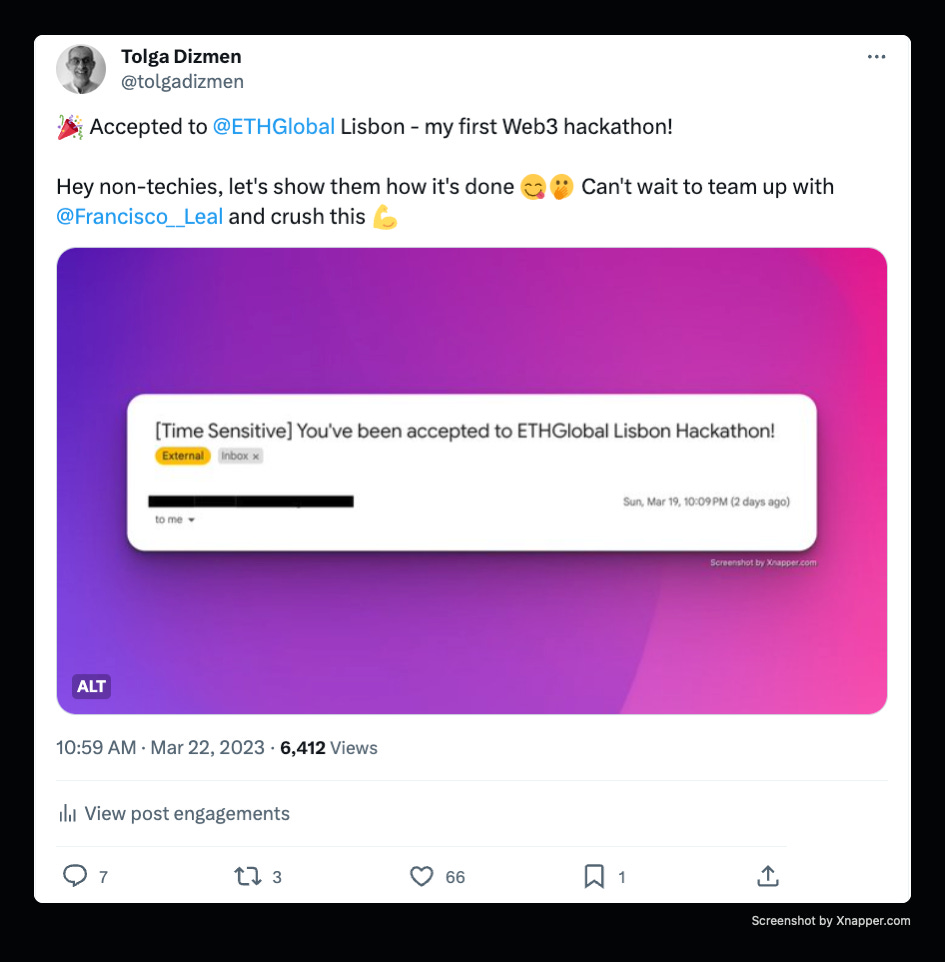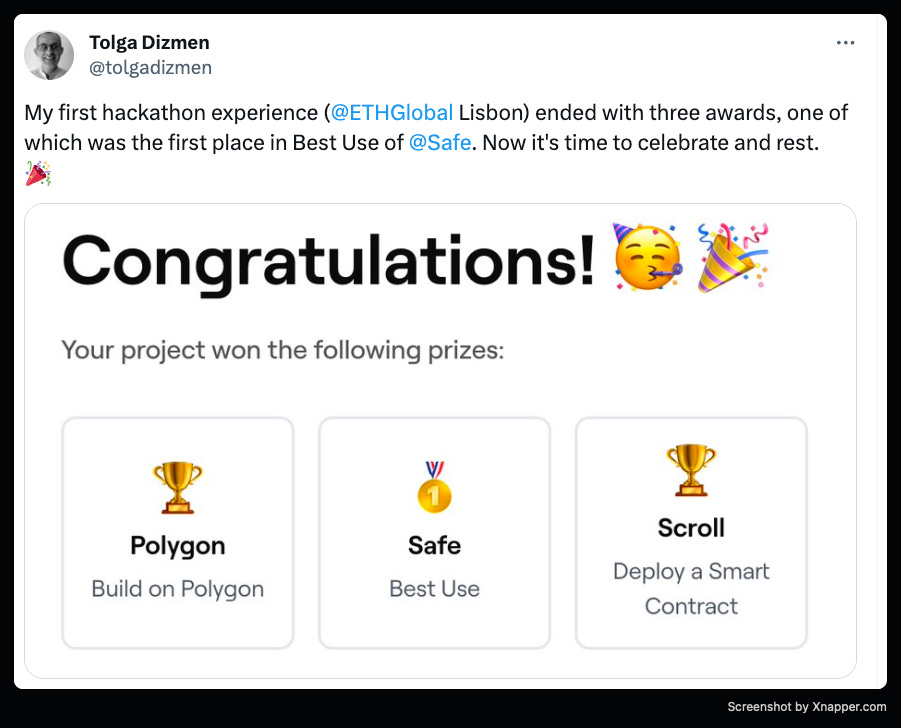A Non-Techie's Guide to Thriving at Hackathons
From my first-hand experience at a hackathon, I've crafted a detailed guide that covers every step of the journey.
I'm not an engineer (developer) or a designer. Yet, this year, I took part in two hackathons and came home with prizes from both. You can do it too. Trust me, it's not that hard. It boils down to two main components:
Join a team.
Let your non-tech skills shine.
To make things easier for you, I've divided all the steps into the sections below. You can easily follow the specific tasks for each section:
Choosing and Applying for a Hackathon
Finding a Team
Spreading the Word & Sharing
What to do: Pre-Hackathon
What to do: During the Hackathon
What to do: After the Hackathon
Let's dive into the details:
Choosing and Applying for a Hackathon
Look for hackathons you can participate in:
a. Those that are entirely online.
b. Those requiring at least one team member to be present.
c. Those needing the whole team to check in onsite.
Ideally, having the entire team physically together is the best. But you don't have to wait for the perfect scenario. A little online research and you'll find the right event to kick things off.
Registration takes about 15-20 minutes. Don't worry if you have zero experience.
Most don’t charge a participation fee. Just ETHGlobal asks for a tiny amount to be staked – think of it as a deposit; if you don’t show, you lose it.
Most likely, the hackathon will use two platforms: Notion and Discord. You'll get the essential info from Notion, while communication mostly happens on Discord. If you're new to Discord, the interface might seem a bit challenging initially.
Having lived in Lisbon for fifteen months, I was in luck when ETHGlobal decided to host a hackathon here after postponing the one in Istanbul due to elections. They practically came to my doorstep.
Finding a Team
Each hackathon's Discord server usually has a dedicated channel for those looking to form or join teams. This is where your communication skills come into play:
Read messages from those looking for teammates. You'll likely find engineers (either back-end or front-end) on the hunt. Don't get disheartened.
Introduce yourself. Communicate how you, as a non-tech, can contribute. (I'll elaborate on this shortly.)
I was fortunate in this aspect. Two members from my Talent Protocol team mentioned they were joining ETHGlobal Lisbon, and I hopped in. Relationships I had built before the event made finding a team a breeze. Tap into your network:
Spreading the Word & Sharing
Share on your social platforms that you're joining a hackathon.
Mention it's your first time and that you're a non-tech.
Tag the hackathon you're participating in.
I was amazed by the engagement my post got and the overwhelming support that came my way.
Pre-Hackathon Skill: Coordination
Expect to spend some days on the Hackathon's Notion and Discord.
Read through the logistic info. Take notes on essential points.
Familiarize yourself with the requirements for the project submission at the end of the hackathon.
Create a Notion page for your team and neatly arrange all the information you’ve gathered.
Assure your team: "You focus on the tech stuff; I've got the logistics covered. Reach out if you have questions."
Repeat these steps throughout the process.
This approach allows the engineers to concentrate on the core tasks and assures them you've got their backs.
I later joined Ethereum Singapore (virtually) with the same team from ETHGlobal Lisbon. Now, we're prepping for both ETH Lisbon and ETHGlobal Istanbul, where I'll be physically present.
With my accumulated experience, things are more streamlined. I can confidently say, "Friends, for ETH Lisbon, just remember your Eventbrite tickets; I'll handle the rest." Or I can quickly find the right person on Discord to sort out any issues with our project application platform. It's all pretty straightforward.
Pre-Hackathon Skill: Defining Prizes and Goals
As the hackathon approaches, information about prizes and their criteria will be updated on the Hackathon's Notion page. If you're new to this scene, the initial events might feel overwhelming. If unsure, don’t stress.
If you can help clarify your team's goals for participating, you're adding immense value: Is the aim to enhance technical skills? Win prizes? Or add a hackathon participation to their portfolio?
By asking about each team member's objectives, you align everyone's intentions and ensure everyone runs toward the same goal during that limited time (~36 hours). At the very least, you're making everyone's intentions clear.
Filipe, the CPO of Talent Protocol, caught me off guard by raising this point during our first hackathon. I merely stated, "I have no clue about this; I'm here to learn." The majority voted for "winning the prize" which turned out to be the perfect goal for our team. I realized this later.
Pre-Hackathon Skill: Strategy
This is where strategy skills come into play. You can't start coding before the hackathon starts. But discussing the project and deciding what you want to achieve is, of course, allowed.
Gather the team.
Outline the problem you want to solve. Write it in two sentences; achieve consensus. (Sometimes your goal might be to win a specific prize. So, you clarify the project that meets the conditions for that prize. But finalize what you will produce in those 36 hours.)
If possible, draft at least one use case. Think of users facing the problem you defined. How do they encounter and use your product, and how does it solve their issue? Be clear on this.
By doing these, you'll pave the way for other team members to prepare in their respective fields. For instance, a front-end developer might chime in saying, "Hmm, I think we can use this UI component; what do you think?"
During the Hackathon Skill: Coordination
The hackathon starts and ends in a blink of an eye. If the entire team is in the same location, coordination flows naturally.
During my second hackathon, two of us were in Singapore, and the other two (including me) were in Lisbon. With a seven-hour time difference, coordination became crucial.
In such cases, having one person in each city monitoring the flow of information and ensuring updates is essential. Unless, of course, you're prepared to go without sleep for 36 hours. But we're hackers who don't compromise on sleep.
During the Hackathon Skill: Storytelling
This is where you can make a significant contribution. As developers code, you'll see your product come to life. Of course, it won't be a high-end design. The point is that it should work. As they flesh out the product, start preparing materials to explain your project for submission:
Create a logo for your project. Make one on Canva if you need to. If there's a designer on the team, ask them. Don't chase perfection. If you can't do any of these, request a friend's help.
Prepare the submission presentation. Remember, you'll be pitching to various juries for prizes. Go check out presentations of projects that have won at hackathons. After seeing three, you'll get the hang of it.
Prepare for the demo. Since there isn't a working product yet, you can't record a demo video. But you can work on the flow and script for the demo.
Record test videos as the product materializes. (Open the product in your browser and use a screen recording program. I use either Tella or Screen Studio for different demo requirements.) Test videos help you test your script and see the duration of your demo video. Preparing in advance is helpful since there's a time limit.
You can practice the presentation with other hackathon participants or friends (online hackathon support line). Doing a couple of tests might be beneficial.
During my first hackathon, I learned by helping Filipe with all these tasks. In the second one, I recorded the demo video using my own voice. If you ever come across a project demo titled "Buidler.Fi", yes, I'm the one responsible for that quirky thing.
At the End of the Hackathon Skill: Project Submission
Make sure to submit before the final deadline and include all necessary information.
Naturally, there will be details you need to get from the team. If you've done your homework before the hackathon, you'll know what they are. For instance, you'll know that you need to get details about the tools the engineers used from them.
If you face any issues during the application, don't worry; promptly write in the relevant channel on Discord and share. Rest assured, others face similar issues, and the organizing team will help.
At the End of the Hackathon Skill: Pitch
Once you've submitted the project, the work isn't over. You pitch to the main jury and the jury of sponsors you applied for prizes from.
Be ready to explain the essence and functionality of the project within a maximum of 5 minutes.
Always have someone from the technical team with you.
If you've applied for many prizes, split the team in two to make all the pitches on time.
After the Hackathon Skill: Prize Collection
We've come to the most exciting part. After the pitches, there's a ceremony where all hackers gather in the main hall, and the prizes are announced. It could be beneficial to have a strategy to win a prize from one sponsor, at least. Seeing the name of your project on the screen is pretty cool.
I returned from both hackathons with prizes. We won 2,750 USD from the first and 5,000 USD from the second. If you add both and divide by four (our team member count), you can calculate my share.
I hope this guide, prepared based on my experiences, gives you the necessary spark to attend your first hackathon. I easily adapted thanks to the support of Filipe and Leal from the Talent Protocol team. That's why finding a team with the right people is the most critical step.
Bonus: I'm preparing a Notion template to use during hackathons. If you're interested, leave your email address here. I'll share it once it's ready.
Good luck to you all!
Tolga






Wow this is great -- congrats on the victories ;)